In today’s fast-paced and interconnected work environments, teamwork has become indispensable for success.
Teamwork refers to the collaborative efforts of individuals who combine their unique skills, knowledge, and perspectives to accomplish shared goals. It is the driving force behind innovation, problem-solving, and effective communication within organizations. Effective teamwork allows teams to maximize productivity, foster creativity, and create a supportive work culture.
By harnessing the power of collaboration, organizations can unlock the full potential of their workforce and achieve remarkable outcomes.
What is teamwork?

Teamwork is the collaborative effort of individuals working together towards a shared goal. It involves combining skills, knowledge, and resources to achieve desired outcomes. Effective teamwork relies on cooperation, coordination, and communication.
Each member contributes unique strengths and perspectives to a team, fostering innovation and better decision-making. Clear roles and open communication are crucial for success. Trust and respect create a positive team culture.
Teamwork enhances efficiency by dividing tasks and leveraging individual strengths. It promotes workload management and a sense of belonging. Challenges like conflicts are addressed through open dialogue and conflict resolution techniques.
Ultimately, teamwork is vital for organizational success. It empowers individuals, leverages collective intelligence, and accomplishes complex tasks. By working together, teams achieve more than individuals alone.
What are the characteristics of successful teamwork?
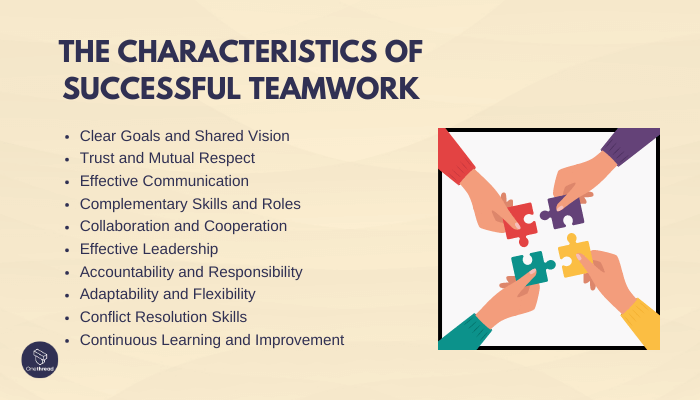
Successful teamwork is marked by a combination of key characteristics that contribute to effective collaboration, communication, and goal achievement. Here are the essential characteristics of successful teamwork:
Clear Goals and Shared Vision
Establishing clear goals and a shared vision is fundamental to successful teamwork. Team members must clearly understand what they are working towards and how their efforts contribute to the larger objectives.
When team members share a common vision, they are more likely to align their actions and work cohesively towards the team’s goals.
Trust and Mutual Respect
Trust and mutual respect are the foundation of successful teamwork. Team members must have confidence in each other’s abilities, intentions, and reliability. When there is trust, team members feel comfortable expressing their ideas, sharing feedback, and taking calculated risks.
Mutual respect ensures everyone’s contributions are valued and acknowledged, creating a positive team environment.
Effective Communication
Open and effective communication is crucial for successful teamwork. Team members should be able to express their thoughts, ideas, and concerns clearly and respectfully. Active listening is equally essential, as it demonstrates respect and understanding.
Transparent and timely communication helps to avoid misunderstandings, encourages collaboration, and strengthens team dynamics.
Complementary Skills and Roles
Successful teams bring together individuals with complementary skills and expertise. Each team member should have a unique set of skills that contributes to the overall team’s capabilities.
Assigning roles based on individual strengths ensures that tasks are performed effectively and efficiently. When team members feel valued for their expertise, they are likelier to contribute their best work.
Collaboration and Cooperation
Collaboration and cooperation are central to successful teamwork. Team members should actively collaborate, leveraging their diverse perspectives and knowledge to solve problems, generate ideas, and make decisions.
Cooperation entails a willingness to support and assist one another, fostering a sense of unity and shared responsibility.
Effective Leadership
Successful teamwork requires effective leadership. A capable leader guides the team toward achieving its goals, ensures clear communication, and facilitates the resolution of conflicts.
A strong leader empowers team members, delegates tasks effectively, and fosters a positive and inclusive team culture.
Accountability and Responsibility
Accountability and responsibility are integral to successful teamwork. Each team member should be accountable for their tasks and responsibilities, delivering quality work within agreed-upon timelines.
When team members take ownership of their commitments, it strengthens trust and confidence in the team.
Adaptability and Flexibility
Successful teams are adaptable and flexible in response to changes, challenges, and new information.
They can adjust their plans and approaches, embracing new ideas and perspectives. Team members should be open to feedback and willing to change to achieve optimal results.
Conflict Resolution Skills
Conflicts are a natural part of teamwork, but successful teams can address and resolve conflicts effectively.
They employ constructive communication techniques, actively listen to different viewpoints, and seek solutions that satisfy all parties involved. Conflict resolution skills contribute to a positive team environment and strengthen relationships among team members.
Continuous Learning and Improvement
Successful teams embrace a culture of continuous learning and improvement. They reflect on their experiences, celebrate successes, and learn from failures.
Team members actively seek feedback, engage in professional development opportunities, and share knowledge to enhance their skills and contribute to the team’s growth.
Why is teamwork so important in the workplace?
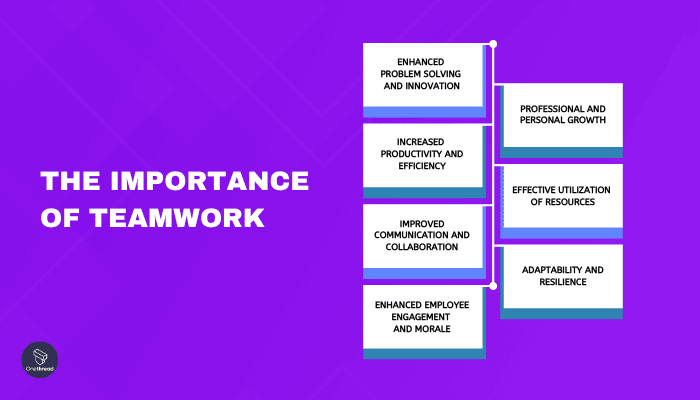
Teamwork is of utmost importance in the workplace as it brings numerous benefits that contribute to the overall success of an organization. Here are the key reasons why teamwork is essential:
Enhanced Problem Solving and Innovation
In a collaborative team environment, diverse perspectives and expertise come together to tackle complex problems. By pooling together different ideas, knowledge, and skills, teams can generate innovative solutions that may not have been possible with individual efforts.
Teamwork fosters creativity, encourages brainstorming, and promotes out-of-the-box thinking, leading to more effective problem-solving and innovation.
Increased Productivity and Efficiency
Teamwork promotes productivity and efficiency by distributing tasks among team members based on their strengths and expertise. When work is divided, it can be completed more quickly and effectively.
Furthermore, team members can support and assist each other, leading to smoother workflow, reduced bottlenecks, and improved time management. This division of labor allows organizations to achieve more in less time.
Improved Communication and Collaboration
Effective communication is the backbone of successful teamwork. Team members actively communicate, share information, exchange ideas, and provide feedback.
This open communication enhances understanding, prevents misunderstandings, and promotes better decision-making. Collaboration among team members ensures that everyone is aligned, reduces duplication of effort, and enables seamless coordination.
Enhanced Employee Engagement and Morale
Teamwork creates a sense of belonging, purpose, and camaraderie among employees. When individuals feel valued as part of a team, they are more engaged. Collaboration fosters positive relationships, boosts morale, and creates a supportive work environment.
Engaged employees are more motivated, productive, and committed to achieving common goals.
Professional and Personal Growth
Working in teams provides valuable learning opportunities for individual team members. Collaboration allows individuals to broaden their knowledge, learn from other’s experiences, and develop new skills.
Team members can also share their expertise, contributing to their professional growth. The exchange of ideas and feedback within a team fosters personal growth by challenging individuals to expand their perspectives and continuously improve.
Effective Utilization of Resources
Teamwork ensures the efficient utilization of resources within an organization. By leveraging the strengths of each team member, organizations can maximize the talents and capabilities of their workforce.
Additionally, teams can identify and address potential constraints, allocate resources effectively, and optimize productivity.
Adaptability and Resilience
In today’s fast-paced and ever-changing business environment, teamwork enables organizations to adapt and respond quickly to new challenges. Teams can collectively assess situations, develop strategies, and implement necessary changes.
The collaborative nature of teamwork promotes resilience and agility, enabling organizations to navigate uncertainties and seize opportunities.
How to promote teamwork in your job
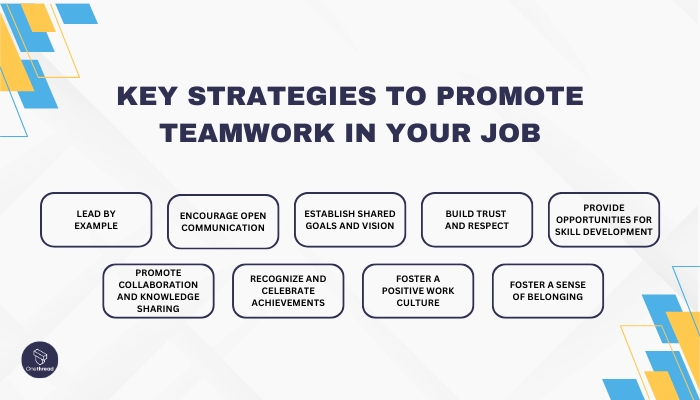
Promoting teamwork in your job is essential for creating a collaborative and supportive work environment. Here are key strategies to encourage and foster teamwork:
Lead by Example
As an individual contributor, you can promote teamwork by demonstrating collaborative behavior.
Be proactive in offering help, supporting your colleagues, and actively participating in team activities. By leading by example, you inspire others to embrace teamwork and collaboration.
Encourage Open Communication
Effective communication is crucial for fostering teamwork. Encourage open and honest communication among team members. Create opportunities for sharing ideas, providing feedback, and addressing concerns.
Promote active listening and ensure that everyone has a chance to voice their opinions and contribute to discussions.
Establish Shared Goals and Vision
Ensure that team members clearly understand shared goals and a common vision. Align individual objectives with team goals to promote unity and collective purpose.
Encourage team members to actively contribute to defining and refining the team’s objectives, fostering a sense of ownership and commitment.
Build Trust and Respect
Trust and respect are the foundation of successful teamwork. Create an environment where team members feel safe to express their ideas, take risks, and share their perspectives.
Encourage collaboration, value diverse viewpoints, and foster a culture of mutual respect and appreciation.
Promote Collaboration and Knowledge Sharing
Facilitate collaboration by providing platforms and opportunities for team members to collaborate on projects and share knowledge. Encourage cross-functional collaboration and create a culture of continuous learning and information exchange.
Foster an environment where team members feel comfortable seeking and offering help to one another.
Recognize and Celebrate Achievements
Acknowledge and celebrate team achievements to boost morale and motivation. Recognize individual contributions and the collective effort of the team. Publicly appreciate the successes, both big and small, to reinforce the value of teamwork and encourage continued collaboration.
Foster a Positive Work Culture
Promote a positive work culture that supports teamwork. Encourage teamwork through team-building activities, such as workshops, retreats, or social events.
Emphasize the importance of collaboration in performance evaluations and recognize and reward collaboration and teamwork in the workplace.
Provide Opportunities for Skill Development
Support the professional growth of team members by providing opportunities for skill development and training. Encourage individuals to expand their expertise and share their knowledge with others.
When team members feel empowered and supported in their personal growth, they are more likely to actively contribute to the team’s success.
Foster a Sense of Belonging
Create a sense of belonging and camaraderie within the team. Encourage team members to get to know each other personally, fostering stronger relationships and trust.
Organize team-building activities that promote team bonding and create opportunities for team members to connect beyond work-related tasks.
5 team-building Exercises for the Workplace
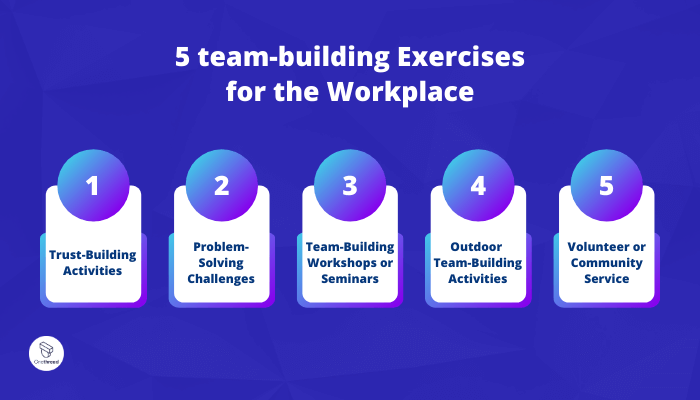
Team-building exercises are a great way to foster collaboration, strengthen relationships, and improve communication within the workplace. Here are five team-building exercises you can implement:
Trust-Building Activities
Trust is crucial for effective teamwork. Conduct trust-building exercises like the Trust Fall, where team members take turns falling backward, relying on their colleagues to catch them. This exercise promotes trust, communication, and mutual support.
Problem-Solving Challenges
Engage teams in problem-solving activities that require collaboration and critical thinking. For example, you can provide a complex puzzle or a team-based scavenger hunt. These challenges encourage teamwork, creativity, and strategic thinking.
Team-Building Workshops or Seminars
Organize team-building workshops or seminars facilitated by professionals. These sessions can focus on improving communication, enhancing teamwork skills, or fostering a positive team culture. Such workshops provide valuable insights and tools that team members can apply daily.
Outdoor Team-Building Activities
Outdoor activities offer a change of environment and promote team bonding. Consider activities like ropes courses, adventure races, or team-building games in natural settings.
These activities encourage collaboration, problem-solving, and building camaraderie outside of the usual work context.
Volunteer or Community Service
Engaging in volunteer work or community service as a team promotes a sense of unity and shared purpose.
Participate in activities such as cleaning up a local park, organizing a charity event, or volunteering at a shelter. These activities not only foster teamwork but also contribute positively to the community.
Elevating Teamwork at the Workplace with Onethread
Building a cohesive and efficient team is the bedrock of workplace success. Onethread is a dynamic catalyst, propelling teamwork to new heights through various features that nurture collaboration, communication, and shared accomplishments.
Centralized Task Management for Unified Goals:
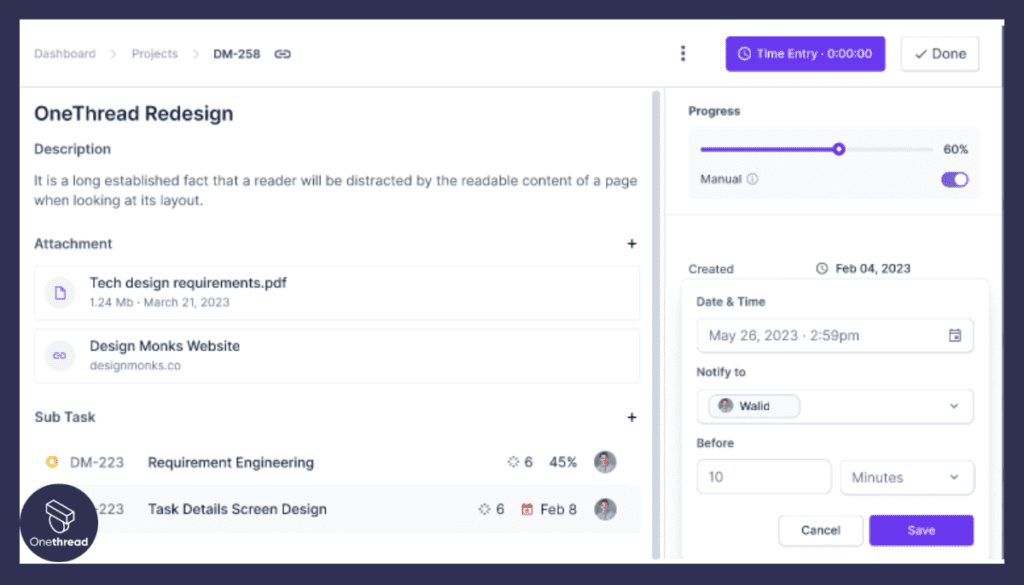
Onethread’s task management feature transforms individual efforts into collective triumphs. Team members can access a centralized platform to view tasks, assign responsibilities, and track progress collaboratively. This ensures that everyone is aligned with shared goals, fostering a sense of unity and purpose.
Seamless Communication for Enhanced Coordination:
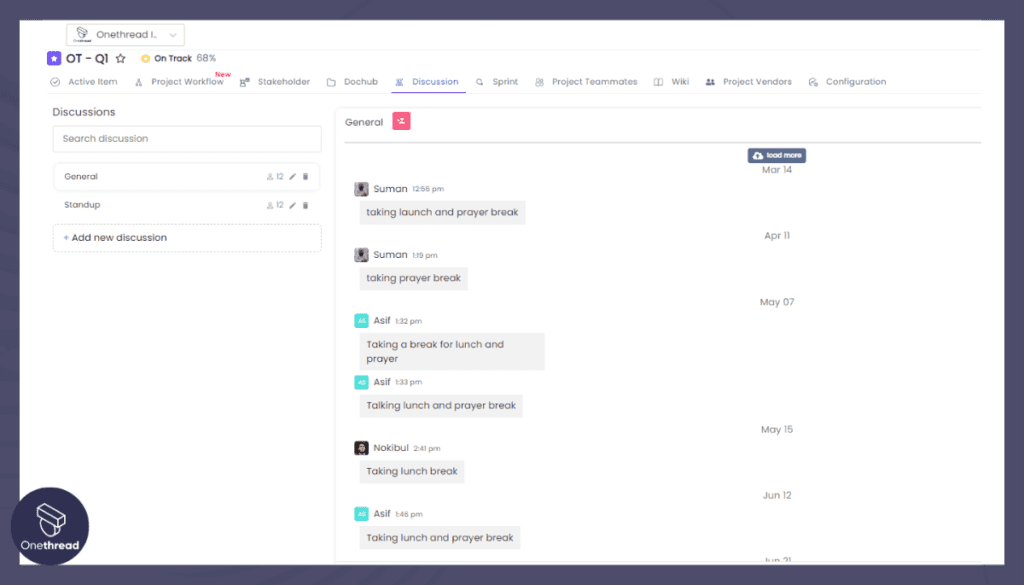
Onethread’s real-time messaging facilitates seamless communication, ensuring that team members remain connected and informed. Questions can be asked, updates can be shared, and discussions can occur effortlessly, bridging gaps and promoting a strong camaraderie regardless of physical location.
Collaborative Document Sharing and Editing:
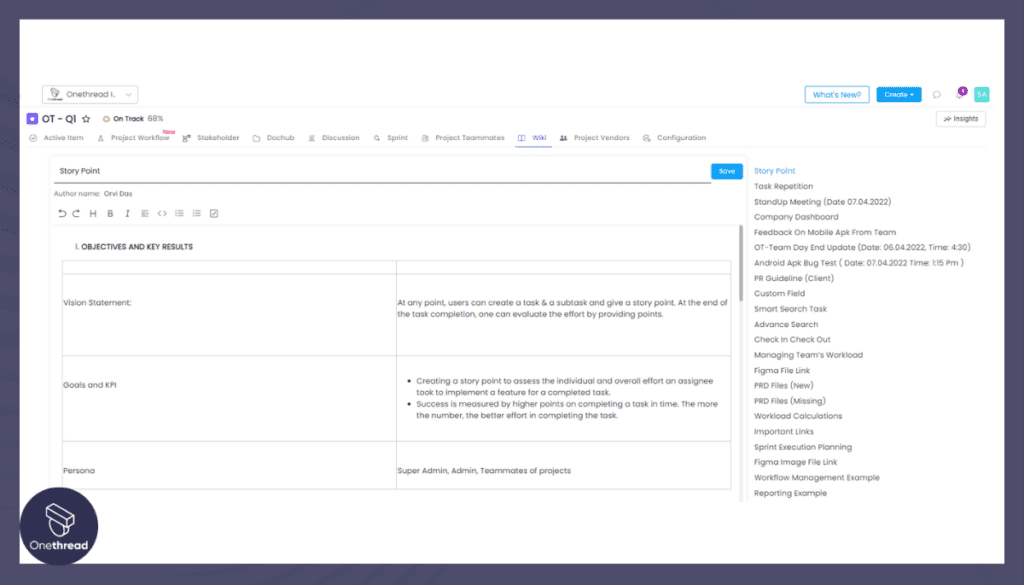
The power of collaboration is amplified through Onethread’s document-sharing and editing capabilities. Multiple team members can work on the same document asynchronously, leaving comments and suggestions for continuous improvement. This inclusive approach ensures that diverse perspectives contribute to refined outcomes.
Transparency with Task Assignments and Deadlines:
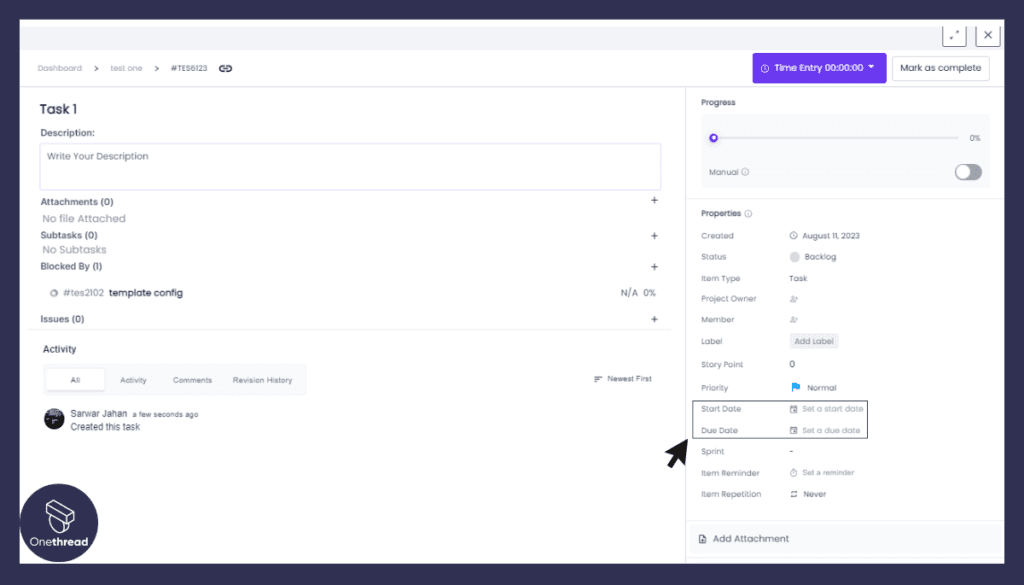
Onethread’s task assignment feature fosters transparency by clearly outlining responsibilities and deadlines. Team members can view who is accountable for what, eliminating confusion and enabling proactive support. This transparency promotes accountability and encourages team members to rely on and help one another.
Data Visualization for Informed Decision-Making:
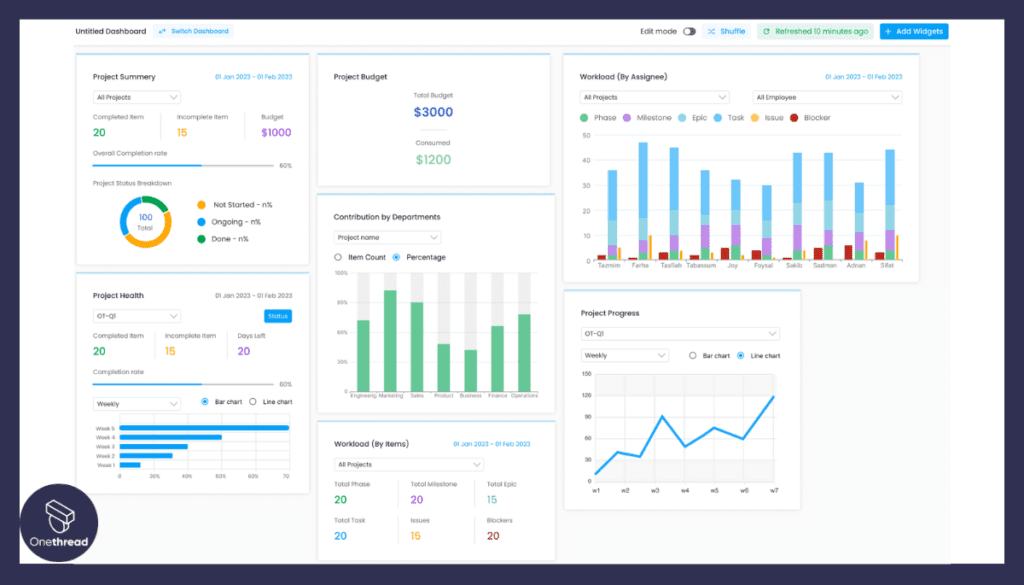
In teamwork, informed decisions are pivotal. Onethread’s data visualization tools provide insights into project progress, helping teams make data-driven choices. A shared understanding of project metrics promotes consensus and empowers the team to navigate challenges with a unified vision.
With Onethread as your ally, the workplace becomes a thriving hub of collaboration where every individual’s contribution harmonizes to create extraordinary achievements.
Final Words
Teamwork is the backbone of a successful workplace. It enhances problem-solving, communication, and productivity. Teams can achieve remarkable results by fostering trust, promoting collaboration, and encouraging open communication.
Engaging in team-building exercises further strengthens relationships and fosters a positive work culture.
Embracing the power of teamwork creates a supportive environment where individuals thrive and collaborate toward shared goals. Organizations can overcome challenges, drive innovation, and achieve lasting success through effective teamwork.
